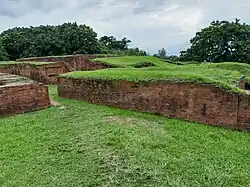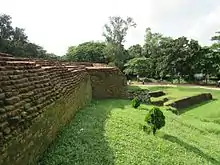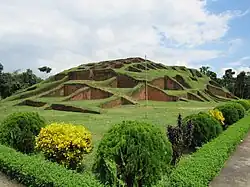Shibganj
শিবগঞ্জ | |
|---|---|
 Govinda Bhita, Mahasthangarh | |
.svg.png.webp) | |
| Coordinates: 25°1′N 89°19′E / 25.017°N 89.317°E | |
| Country | |
| Division | Rajshahi |
| District | Bogra |
| Area | |
| • Total | 314.92 km2 (121.59 sq mi) |
| Population (2011 census)[1] | |
| • Total | 378,700 |
| • Density | 1,200/km2 (3,100/sq mi) |
| Time zone | UTC+6 (BST) |
| Postal code | 5810 |
| Website | shibganj |
Shibganj Upazila (Bengali: শিবগঞ্জ উপজেলা) is an upazila of Bogra District in the Division of Rajshahi, Bangladesh. The upazila was created in 1983.[2] It is named after its administrative center, the town of Shibganj.
Geography
Shibganj Upazila has a total area of 314.92 square kilometres (121.59 sq mi).[1] It is the northernmost upazila of Bogra District. It borders Rangpur Division to the north, Sonatala and Gabtali upazilas to the east, Bogra Sadar and Kahaloo upazilas to the south, Dupchanchia Upazila to the southwest, and Joypurhat District to the west. The Karatoya River flows south through the upazila.[2]
Demographics
| Year | Pop. (000) | ±% |
|---|---|---|
| 1981 | 283 | — |
| 1991 | 313 | +10.6% |
| 2001 | 352 | +12.5% |
| 2011 | 379 | +7.7% |
| Source: Bangladesh Bureau of Statistics[1] | ||
According to the 2011 Bangladesh census, Shibganj Upazila had 99,242 households and a population of 378,700. 74,741 (19.74%) were under 10 years of age. Shibganj had a literacy rate (age 7 and over) of 44.09%, compared to the national average of 51.8%, and a sex ratio of 989 females per 1000 males. 21,643 (5.72%) lived in urban areas.[1][3]
Points of interest

Mahasthangarh is the earliest urban archaeological site in Bangladesh. It's also the largest. The citadel covers more than 2 square kilometres (0.77 sq mi), and many more mounds are spread over the surrounding 100 square kilometres (39 sq mi) on the west bank of the Karatoya River. Lonely Planet describes it as one of Bangladesh's two "most famous and impressive archaeological sites." A museum exhibits artifacts excavated at the site: sculptures, inscriptions, terracotta plaques depicting scenes from daily life, beads, coins, and ceramics shards.[4][5]

Administration
Shibganj Upazila is divided into Shibganj Municipality and 12 union parishads: Shibganj, Bihar, Roynagar, Buriganj, Majhihatta, Pirab, Atmul, Kichak, Maidanhata, Deuli, Mokamtala, and Saidpur. The union parishads are subdivided into 233 mauzas and 409 villages.
Shibganj Municipality is subdivided into 9 wards and 31 mahallas.[1]
Education
There are seven colleges in the upazila. They include Mohasthan Mahi Sawar Degree College, Mokamtala Women's Degree College, Pirob United Degree College, Chowdhury Adarsha Mahila College and Govt. M H College, founded in 1972.[6]
The madrasa education system in the upazila includes five fazil madrasas.[7]
Notable residents
- Prafulla Chaki, revolutionary and nationalist, was born in Bihar village under the upazila in 1888.[8]
- Mahmudur Rahman Manna, politician, stood as a Bangladesh Awami League candidate for the Bogra-2 constituency in the general election of 2001. However, he lost the poll.[9]
- M. R. Akhtar Mukul, author and journalist, migrated to Mahasthangarh after partition in 1947.[10]
See also
References
- 1 2 3 4 5 6 7 "Bangladesh Population and Housing Census 2011 Zila Report – Bogra" (PDF). bbs.gov.bd. Bangladesh Bureau of Statistics.
- 1 2 Islam, Md Sahidul (2012). "Shibganj Upazila (Bogra district)". In Islam, Sirajul; Jamal, Ahmed A. (eds.). Banglapedia: National Encyclopedia of Bangladesh (Second ed.). Asiatic Society of Bangladesh.
- ↑ "Community Tables: Bogra district" (PDF). bbs.gov.bd. Bangladesh Bureau of Statistics. 2011.
- ↑ Alam, Shafiqul (2012). "Mahasthan". In Islam, Sirajul; Jamal, Ahmed A. (eds.). Banglapedia: National Encyclopedia of Bangladesh (Second ed.). Asiatic Society of Bangladesh.
- ↑ McCrohan, Daniel (2012). Lonely Planet Bangladesh (Seventh ed.). p. 89. ISBN 978-1-74179-458-8.
- ↑ "Shibganj Govt. M H College". Shibganj M. H. Degree College. Retrieved July 17, 2014.
- ↑ "List of Institutions". Ministry of Education. Retrieved July 15, 2014.
- ↑ Mozammel, Md. Muktadir Arif (2012). "Chaki, Prafulla". In Islam, Sirajul; Jamal, Ahmed A. (eds.). Banglapedia: National Encyclopedia of Bangladesh (Second ed.). Asiatic Society of Bangladesh.
- ↑ "A brief history of Manna's political journey". Daily Sun. February 24, 2015. Retrieved October 28, 2017.
- ↑ "Bangladesh: Mr Akhtar Mukul passes away". The Daily Star. Dhaka. June 27, 2004. Archived from the original on March 7, 2012. Retrieved November 20, 2010.
